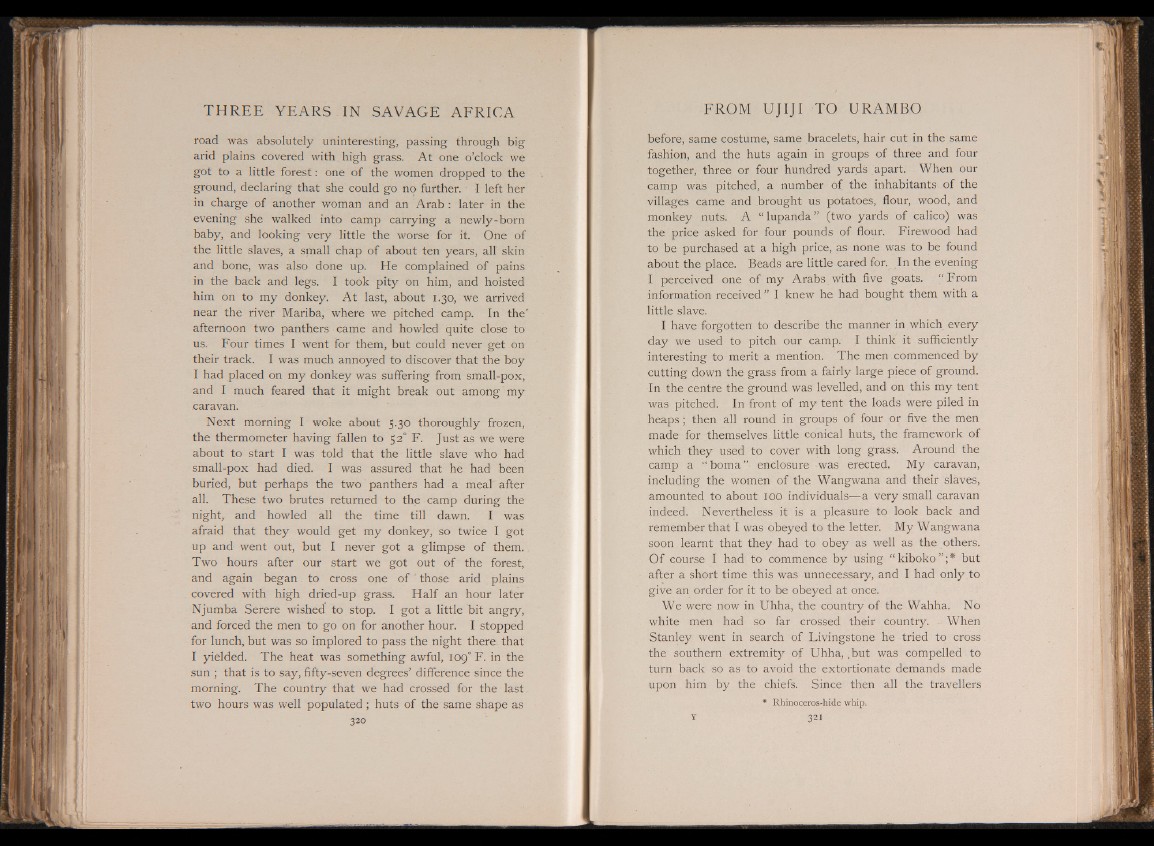
road was absolutely uninteresting, passing through big
arid plains covered with high grass. At one o’clock we
got to a little forest: one of the women dropped to the
ground, declaring that she could go no further. I left her
in charge of another woman and an Arab : later in the
evening she walked into camp carrying a newly-born
baby, and looking very little the worse for it. One of
the little slaves, a small chap of about ten years, all' skin
and bone, was also done up. He complained of pains
in the back and legs. I took pity on him, and hoisted
him on to my donkey. At last, about 1.30, we arrived
near the river Mariba, where we pitched camp. In the*
afternoon two panthers came and howled quite close to
us. Four times I went for them, but could never get on
their track. I was much annoyed to discover that the boy
I had placed on my donkey was suffering from small-pox,
and I much feared that it might break out among my
caravan.
Next morning I woke about 5.30 thoroughly frozen,
the thermometer having fallen to 52° F. Just as we were
about to start I was told that the little slave who had
small-pox had died. I was assured that he had been
buried, but perhaps the two panthers had a meal after
all. These two brutes returned to the camp during the
night, and howled all the time till dawn. I was
afraid that they would get my donkey, so twice I got
up and went out, but I never got a glimpse of them.
Two hours after our start we got out of the forest,
and again began to cross one of those arid plains
covered with high dried-up grass. Half an hour later
Njumba Serere wished to stop. I got a little bit angry,
and forced the men to go on for another hour. I stopped
for lunch, but was so implored to pass the night there that
I yielded. The heat was something awful, 109° F. in the
sun ; that is to say, fifty-seven degrees’ difference since the
morning. The country that we had crossed for the last
two hours was well populated ; huts of the same shape as
320
before, same costume, same bracelets, hair cut in the same
fashion, and the huts again in groups of three and four
together, three or four hundred yards apart. When our
camp was pitched, a number of the inhabitants of the
villages came and brought us potatoes, flour, wood, and
monkey nuts. A “ lupanda” (two yards of calico) was
the price asked for four pounds of flour. Firewood had
to be purchased at a high price, as none was to be found
about the place. Beads are little cared for. In the evening
I perceived one of my Arabs with five goats. “ From
information received ” I knew he had bought them with a
little slave.
I have forgotten to describe the manner in which every
day we used to pitch our camp. I think it sufficiently
interesting to merit a mention. The men commenced by
cutting down the grass from a fairly large piece of ground.
In the centre the ground was levelled, and on this my tent
was pitched. In front of my tent the loads were piled in
heaps; then all round in groups of four or five the men
made for themselves little conical huts, the framework of
which they used to cover with long grass. Around the
camp a “ boma” enclosure was erected. My caravan,
including the women of the Wangwana and their slaves,
amounted to about 100 individuals—a very small caravan
indeed. Nevertheless it is a pleasure to look back and
remember that I was obeyed to the letter. My Wangwana
soon learnt that they had to obey as well as the others.
Of course I had to commence by using “ kiboko” ;* but
after a short time this was unnecessary, and I had only to
give an order for it to be obeyed at once.
We were now in Uhha, the country of the Wahha. No
white men had so far crossed their country. {When
Stanley went in search of Livingstone he tried to cross
the southern extremity of Uhha, .but was compelled to
turn back so as to avoid the extortionate demands made
upon him by the chiefs. Since then all the travellers
* Rhinoceros-hide whip.
Y 32I